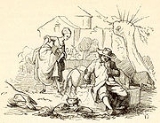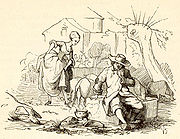
The Swineherd
Encyclopedia
"The Swineherd" is a literary fairy tale
by Hans Christian Andersen
about a prince
who disguises himself as a swineherd to woo an arrogant princess. The tale was first published 20 December 1841 by C. A. Reitzel in Copenhagen, Denmark in Fairy Tales Told for Children. New Collection. The tale appears to be original with Andersen though similar tales are known. "The Swineherd" has been adapted to various media.
at the palace. Once on the job, he creates a musical pot. The princess slogs through the mud to the swineherd's hut and pays ten kisses for the pot. When the swineherd follows the pot with the creation of a musical rattle, she pays one hundred kisses for it. The Emperor, disgusted that his daughter would kiss a swineherd for a toy, casts her out. The prince, having found the princess unworthy of his love, washes his face, dons his royal raiment, and spurns the princess as her father did. The princess is left outside the palace door singing dolefully.
 The tale appears to be Andersen's invention though the punishing of proud princesses is a stock theme in folk and fairy tales. In Basile's Pentamerone
The tale appears to be Andersen's invention though the punishing of proud princesses is a stock theme in folk and fairy tales. In Basile's Pentamerone
(1634) a tale tells of proud Cinziella and her wooing by a prince disguised as a gardener. In the Grimm collections, "King Thrushbeard
" is a similar tale of a royal disguising himself to woo an arrogant princess. Andersen's tale is less sentimental than the traditional tales. In traditional tales, the woman is softened and continues to love the man once he is revealed to be royalty but in Andersen she is cast away and left alone mourning the loss of love and status.
to music by Baron Frederic d'Erlanger and a libretto by Boris Kochno
. The ballet premiered at Covent Garden
18 July 1935 with Irina Baronova
as the Princess and David Lichine
as the Prince. The ballet was first staged in Australia by de Basil's Ballets Russes on 5 December 1936.
An operatic adaptation was undertaken by Nino Rota
(1911–1979) called The Swineherd Prince when he was thirteen. Britain's only permanent marionette theatre, Harlequin Puppet Theatre at Rhos-on-Sea, Wales, presented "The Swineherd" in an adaptation by Eric Brammell in 1958. In the 1950s, Soviet/Russian composer Boris Tchaikovsky
wrote a suite of incidental music
for a radio production of The Swineherd.
Fairy tale
A fairy tale is a type of short story that typically features such folkloric characters, such as fairies, goblins, elves, trolls, dwarves, giants or gnomes, and usually magic or enchantments. However, only a small number of the stories refer to fairies...
by Hans Christian Andersen
Hans Christian Andersen
Hans Christian Andersen was a Danish author, fairy tale writer, and poet noted for his children's stories. These include "The Steadfast Tin Soldier," "The Snow Queen," "The Little Mermaid," "Thumbelina," "The Little Match Girl," and "The Ugly Duckling."...
about a prince
Prince
Prince is a general term for a ruler, monarch or member of a monarch's or former monarch's family, and is a hereditary title in the nobility of some European states. The feminine equivalent is a princess...
who disguises himself as a swineherd to woo an arrogant princess. The tale was first published 20 December 1841 by C. A. Reitzel in Copenhagen, Denmark in Fairy Tales Told for Children. New Collection. The tale appears to be original with Andersen though similar tales are known. "The Swineherd" has been adapted to various media.
Plot
A poor prince wants to marry the Emperor's daughter and sends her two beautiful gifts, a nightingale and a rose. The princess rejects the humble gifts because they're real and natural, rather than artificial. The prince then disguises himself and applies for the position of swineherdSwineherd
A swineherd is a person who looks after pigs. The term has fallen out of popular use in favour of pig farmer.-Swineherds in literature:* Hans Christian Andersen wrote a Fairy tale called, "The Swineherd"....
at the palace. Once on the job, he creates a musical pot. The princess slogs through the mud to the swineherd's hut and pays ten kisses for the pot. When the swineherd follows the pot with the creation of a musical rattle, she pays one hundred kisses for it. The Emperor, disgusted that his daughter would kiss a swineherd for a toy, casts her out. The prince, having found the princess unworthy of his love, washes his face, dons his royal raiment, and spurns the princess as her father did. The princess is left outside the palace door singing dolefully.
Source

Pentamerone
The Pentamerone is a seventeenth-century fairy tale collection by Italian poet and courtier Giambattista Basile.-Background:...
(1634) a tale tells of proud Cinziella and her wooing by a prince disguised as a gardener. In the Grimm collections, "King Thrushbeard
King Thrushbeard
King Thrushbeard is a fairy tale collected by the Brothers Grimm, tale number 52.It is Aarne-Thompson type 900.-Synopsis:A beautiful, but spoiled, rude, and shallow princess criticizes all her suitors because she is too proud. She is impressed with the last of her suitors, but her pride will not...
" is a similar tale of a royal disguising himself to woo an arrogant princess. Andersen's tale is less sentimental than the traditional tales. In traditional tales, the woman is softened and continues to love the man once he is revealed to be royalty but in Andersen she is cast away and left alone mourning the loss of love and status.
Publication
The tale was first published by C. A. Reitzel in Copenhagen, Denmark on 20 December 1841 in Fairy Tales Told for Children. New Collection. Third Booklet. 1842. and first translated into English by Charles Boner in 1846 who published it in A Danish Storybook.Adaptations
The tale has been adapted to various media. Les cent baisers (The Hundred Kisses), is a ballet choreographed by Bronislava NijinskaBronislava Nijinska
Bronislava Nijinska - February 22, 1972)) was a Russian dancer, choreographer, and teacher of Polish descent.Nijinska was born in Minsk, the third child of the Polish dancers Tomasz and Eleonora Nijinska . Her brother was Vaslav Nijinsky...
to music by Baron Frederic d'Erlanger and a libretto by Boris Kochno
Boris Kochno
Boris Kochno was a Russian poet, dancer and librettist. He was close with Karol Szymanowski who gave him as a gift a Russian translation of the chapter The Symposium from Efebos, the composer's unpublished novel. Szymanowski also dedicated four poems to him...
. The ballet premiered at Covent Garden
Covent Garden
Covent Garden is a district in London on the eastern fringes of the West End, between St. Martin's Lane and Drury Lane. It is associated with the former fruit and vegetable market in the central square, now a popular shopping and tourist site, and the Royal Opera House, which is also known as...
18 July 1935 with Irina Baronova
Irina Baronova
Irina Mikhailovna Baronova , FRAD was a Russian ballerina who was one of the Baby Ballerinas of the Ballet Russe de Monte Carlo, discovered by George Balanchine in Paris in the 1930s...
as the Princess and David Lichine
David Lichine
David Lichine / Дэвид Лишин was a Russian/French/US ballet dancer and choreographer; he was born as Давид Лихтенштейн David Lichtenštejn / David Lichtenstein ....
as the Prince. The ballet was first staged in Australia by de Basil's Ballets Russes on 5 December 1936.
An operatic adaptation was undertaken by Nino Rota
Nino Rota
Nino Rota was an Italian composer and academic who is best known for his film scores, notably for the films of Federico Fellini and Luchino Visconti...
(1911–1979) called The Swineherd Prince when he was thirteen. Britain's only permanent marionette theatre, Harlequin Puppet Theatre at Rhos-on-Sea, Wales, presented "The Swineherd" in an adaptation by Eric Brammell in 1958. In the 1950s, Soviet/Russian composer Boris Tchaikovsky
Boris Tchaikovsky
Boris Alexandrovich Tchaikovsky was a Soviet composer, born in Moscow, whose oeuvre includes orchestral works, chamber music and film music. He is considered as part of the second generation of Russian composers, following in the steps of Pyotr Tchaikovsky and especially Mussorgsky.He was admired...
wrote a suite of incidental music
Incidental music
Incidental music is music in a play, television program, radio program, video game, film or some other form not primarily musical. The term is less frequently applied to film music, with such music being referred to instead as the "film score" or "soundtrack"....
for a radio production of The Swineherd.
External links
- "Svinedrengen". Original Danish text
- "The Swineherd". English translation by Jean HersholtJean HersholtJean Pierre Hersholt was a Danish-born actor who lived in the United States, where he was a leading film and radio talent, best known for his 17 years starring on radio in Dr. Christian and for playing Shirley Temple's grandfather in Heidi...
- "The Swineherd" at SurLaLune

